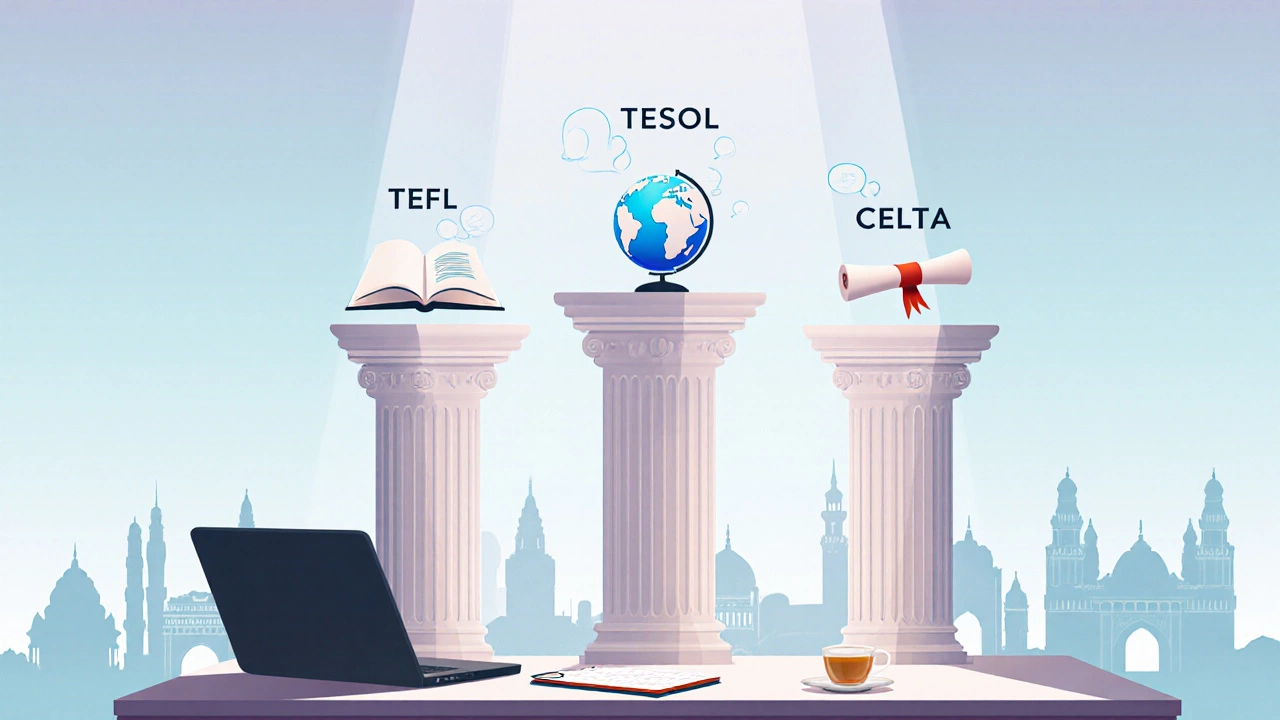
English Teaching Income Estimator
Estimate Your Teaching Income
Calculate potential earnings based on your certification type, teaching method, and experience level in India.
Monthly Earnings
Online Hourly Rate
* Income estimates based on market data from Indian language schools and tutoring platforms
Enter your details to see potential income estimates
Wondering if you can teach English without a degree in India? The short answer is yes - but there are hoops to jump through, certifications to collect, and legal nuances to respect. Below, we break down everything you need to know: the law, the shortcuts, the best credentials, and how to land a job whether you aim for a classroom, a tutoring centre, or an online platform.
Key Takeaways
- You don’t need a formal college degree to start teaching English in India, but you must have a recognized teaching credential.
- TEFL, TESOL, and CELTA are the three most respected certifications for non‑degree teachers.
- State education boards and private institutes have different hiring rules - always check the specific requirements of the school or platform.
- Online tutoring opens doors to global students, often with lower entry barriers.
- Continuous professional development, like workshops from the British Council, boosts credibility and earnings.
Understanding the Legal Landscape
India’s education system is regulated at both the central and state levels. The National Council for Teacher Education (NCTE) is the statutory body that sets standards for teacher eligibility in schools affiliated with the Central Board of Secondary Education (CBSE) and many state boards. Historically, NCTE mandates a minimum of a Bachelor’s degree plus a teaching diploma (like B.Ed). However, the rule has a loophole: NCTE recognizes certain professional certifications as "equivalent qualifications" for non‑degree holders, especially for language instruction in private coaching centres and online platforms.
For private English language institutes, the law is more relaxed. The Supreme Court’s 2019 judgment affirmed that private entities can recruit teachers based on skill and certification rather than formal degrees, provided the institute is registered under the relevant state education department.
What Credentials Count?
When you lack a degree, the market looks for internationally recognized teaching certificates. Below is a quick rundown of the three heavy‑hitters.
| Certification | Typical Duration | Recognition in India | Cost (USD) | Best For |
|---|---|---|---|---|
| TEFL | 120-150 hrs (online) | Widely accepted by private institutes & online platforms | 150-300 | Beginners, online tutoring |
| TESOL | 100-120 hrs (online/ blended) | Recognized by many Indian language schools | 200-350 | Those targeting corporate English training |
| CELTA | 120 hrs (intensive, in‑person) | Highest prestige; accepted by top schools | 1,500-2,200 | Teachers aiming for elite institutes or abroad |
Each certification includes a mix of methodology, lesson‑planning, and practicum. Completing a practicum-even a virtual one-shows prospective employers that you can manage a real classroom.
Where to Get Certified
Several Indian hubs offer accredited TEFL/TESOL courses: Bangalore, Delhi, and Mumbai host reputable institutes that blend online theory with onsite teaching practice. International providers like British Council also run TEFL workshops in major Indian cities, giving you a globally recognized badge.
Think about where you want to teach: Matching the credential to the market segment improves your hiring odds and lets you command higher rates. 1. Research local institutes. Cities such as Bangalore, Hyderabad, and Pune have booming English coaching markets. Check their careers pages for "TEFL" or "TESOL" requirements.
2. Leverage job portals. Sites like Naukri, Indeed India, and TeachAway list "non‑degree" English teaching roles. Use keywords: "TEFL teacher", "online ESL tutor".
3. Network on LinkedIn. Join groups like "English Teachers India" and share your certification badge; recruiters often scout these spaces.
4. Register on tutoring platforms. Create a profile on iTalki, Verbling, or MyTutor, upload your TEFL/TESOL certificate, and set your hourly rate.
5. Attend workshops. The British Council and local NGOs host teacher‑training events. Attendance can lead to direct job offers or valuable contacts.
Entry‑level salaries in private tuition centres range from INR 15,000 to 25,000 per month. Online tutors can earn $8‑$20 per hour, depending on experience and student base. CELTA‑qualified teachers often start at INR 35,000‑45,000 per month in elite institutes, and they have a clearer path to administrative or curriculum‑design roles. Continuing professional development-like a second‑level TEFL specialization in “Teaching Young Learners” or “Business English”-can boost your rate by up to 30% within a year. Post‑2023, hybrid models-combining in‑person classes with digital resources-are gaining traction. Institutes now ask teachers to manage Learning Management Systems (LMS) like Moodle or Google Classroom. Adding a basic tech‑skill badge (e.g., Google Certified Educator) can make you stand out, even without a degree. For government‑run schools and CBSE‑affiliated institutions, a degree plus a B.Ed is mandatory. Private tuition centres and online platforms, however, accept TEFL/TESOL certificates as valid qualifications, allowing you to teach without a degree. CELTA carries the highest prestige and opens doors to elite language schools. For most private centres and online tutoring, a 120‑hour TEFL or TESOL certification is sufficient and more cost‑effective. Yes, many providers offer 100% online TEFL courses. Ensure the provider is accredited by bodies like IATEFL or the British Council to avoid low‑quality certificates. Hourly rates typically range from $8 to $20, depending on your certification, experience, and the platform. Top-rated tutors can earn $30+ per hour and attract repeat students. Private tuition centres must be registered with the respective state’s education department. As an individual freelancer, you don’t need a separate registration, but keep a copy of any centre’s registration proof for your records.
Choosing the Right Path for Your Goals
How to Find a Teaching Job Without a Degree
Income Expectations and Growth

Common Pitfalls and How to Avoid Them
Future Trends: The Rise of Hybrid Teaching
Quick Checklist Before You Apply
Do I need a Bachelor's degree to teach English in Indian schools?
Which certification gives the best job prospects in India?
Can I get a TEFL certificate entirely online?
How much can I earn as an online English tutor?
Do I need to register with any Indian authority to teach privately?
